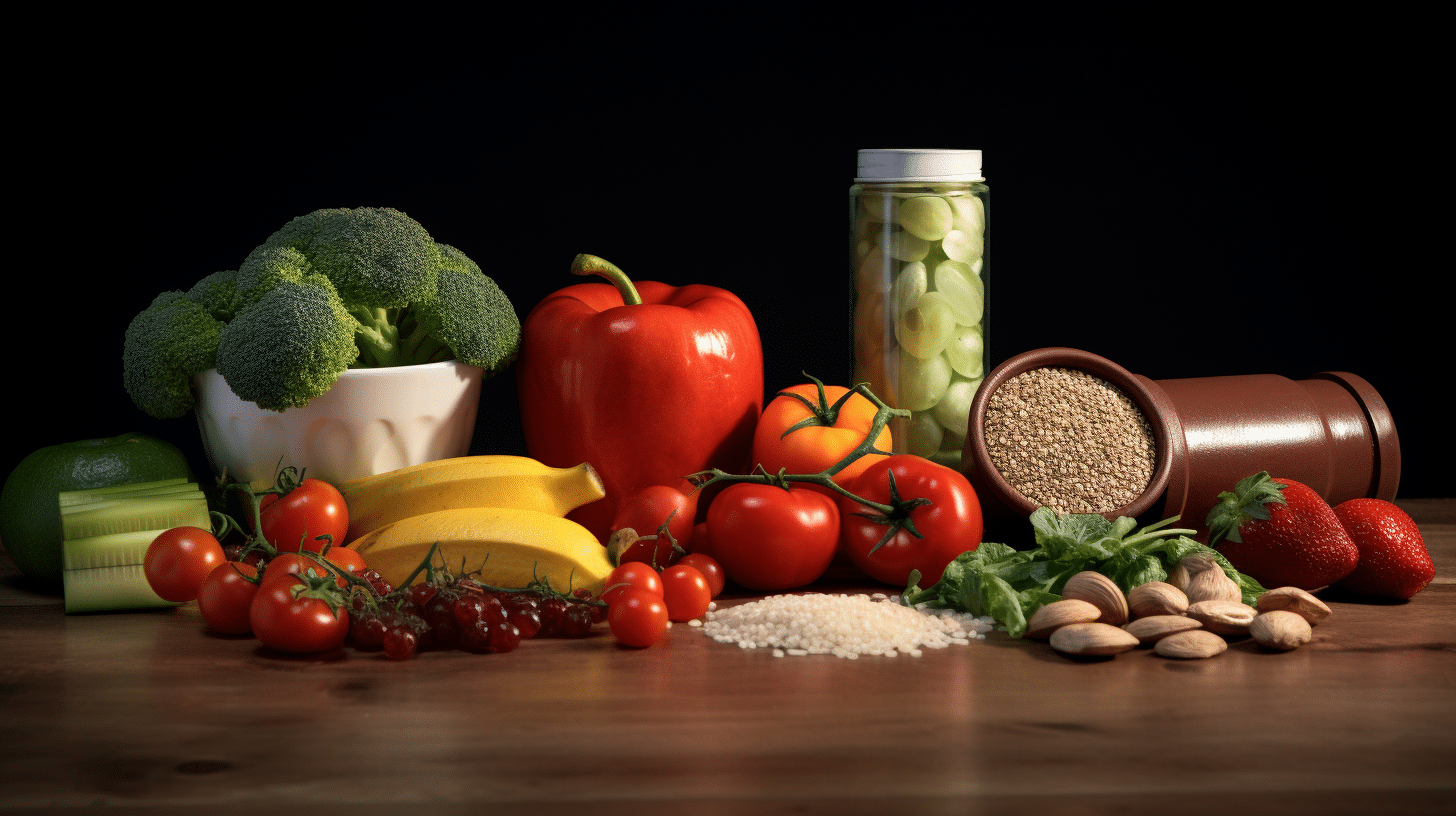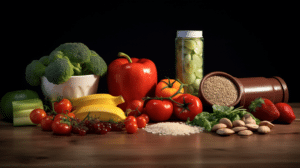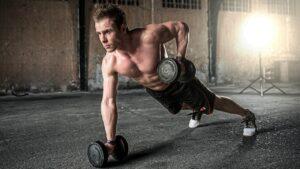Get ready to supercharge your workouts with the power of nutrition!
In the fast-paced fitness world, it’s easy to overlook the importance of fueling your body correctly. But by unpacking the nutrition fundamentals, you can take your workouts to a whole new level.
Imagine this: on one side, you have a workout fueled by empty calories and processed foods that leave you feeling sluggish and drained. On the other side, you have a workout powered by nutrient-rich meals that provide sustained energy, enhance performance, and promote muscle growth. Which scenario sounds more appealing? The answer is clear.
By understanding what to eat before, during, and after exercise and the crucial role hydration plays in your workouts, you can optimize your training regimen like never before. So let’s dive into nutrition and unlock the secrets to energizing your workouts for maximum results.
Key takeaways
-
Nutrient timing is important for pre, during, and post-workout nutrition to sustain energy, boost performance, preserve muscle mass, and aid recovery.
-
Pre-workout nutrition should include a mixed meal 2-3 hours before exercise or a smaller meal 0-60 minutes before training, including protein, carbs, fats, and a low-calorie beverage.
-
During exercise, consuming carbs provides immediate fuel, and including protein with carbs can achieve the same endurance benefits with fewer carbs.
-
Post-workout nutrition should focus on recovery, rehydration, refueling, and muscle building, with a meal including protein, vegetables, carbs, fats, and a low-calorie beverage within 1-2 hours of training.
What to eat before exercise
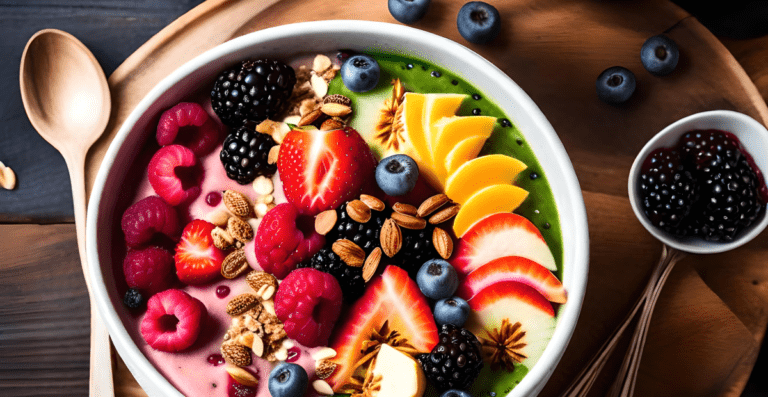
Let’s dive into what to eat before exercise and how it can energize our workouts! Pre-workout nutrition is crucial in providing the energy needed for optimal performance during exercise. You can enhance your workout experience and maximize results by fueling your body with the right foods.
Regarding pre-workout meals or snacks, focusing on a well-balanced diet that includes protein, carbohydrates, and healthy fats is essential. Protein helps maintain or increase muscle size while reducing muscle damage. It also enhances muscle-building capabilities. Carbohydrates fuel your muscles, aid recovery, preserve glycogen stores, and stimulate insulin release. Healthy fats help maintain blood glucose and insulin levels.
There are different approaches to pre-workout nutrition depending on the timing of your exercise session. If you have 2-3 hours before your workout, aim for a mixed meal that includes lean protein sources like chicken or fish, quality carbs such as whole grains or fruits/vegetables, and some healthy fats like avocado or nuts.
If you only have 0-60 minutes before training, opt for a smaller meal that is easier to digest but still provides the necessary nutrients. This could be a protein shake with added veggies for fiber and micronutrients.
Remember that nutrient timing isn’t a magic solution. The total amount of protein and carbohydrates consumed throughout the day is more important than specific timing around workouts. With this in mind, let’s transition into the next section, discussing fueling during exercise to enhance our performance further.
Fueling during exercise

While some may argue that eating during exercise is unnecessary or can lead to digestive issues, fueling with small snacks or sports drinks can provide vital energy and prevent hunger pangs during longer workouts.
When it comes to fueling during exercise, there are a few key points to keep in mind:
-
Carbohydrates
Consuming carbohydrates during exercise can help maintain glycogen stores and fuel your muscles immediately. Aim for 30-60 grams of carbs per hour, depending on the intensity and duration of your workout.
-
Endurance athletes
For endurance athletes participating in prolonged activities such as long-distance running or cycling, consuming carbohydrates becomes even more critical. Sports drinks containing electrolytes and carbohydrates can be a convenient option to replenish fluids and energy.
-
Sports drinks
Sports drinks can benefit workouts lasting more than 60 minutes, combining electrolytes and carbohydrates. These beverages help replace lost fluids and supply energy to keep you going strong.
Fueling during exercise is an essential aspect of optimizing performance and preventing fatigue. You can sustain energy levels and ensure adequate glycogen stores for continued endurance by providing your body with the necessary nutrients, mainly carbohydrates.
Transition into the subsequent section about ‘post-workout recovery meals’: Now that we’ve covered fueling during exercise, let’s move on to the importance of post-workout recovery meals in aiding muscle repair, replenishing glycogen stores, and preparing your body for future workouts.
Post-Workout recovery meals

Now let’s dive into the importance of refueling your body with a post-workout recovery meal to help rebuild muscles, replenish energy stores, and set yourself up for future workouts.
After an intense workout, your muscles need to recover and repair. Consuming a post-workout meal containing protein and carbohydrates can aid in this process. Protein is essential for muscle synthesis and repair, while carbohydrates help replenish glycogen stores depleted during exercise.
When it comes to post-workout meals, focus on consuming high-quality protein sources such as lean meats, eggs, or plant-based proteins like tofu or beans. Pairing these proteins with complex carbohydrates like whole grains or fruits can provide a balanced mix of nutrients to support recovery. Including vegetables in your post-workout meal can provide essential vitamins and minerals for optimal health.
It’s important to note that the timing of your post-exercise meal is crucial. Aim to consume this meal within one to two hours after your workout to maximize nutrient absorption and facilitate muscle recovery. If you’re not hungry immediately after exercise, consider opting for a liquid nutrition option like a protein shake or smoothie.
Remember that total daily protein and carbohydrate consumption is more critical than specific nutrient timing regarding overall nutrition goals. So if you’re unable to have a quick post-workout meal due to scheduling constraints, don’t stress too much as long as you’re meeting your daily nutritional needs.
Transitioning into the subsequent section about the importance of hydration, it’s vital to understand how proper hydration plays a significant role in optimizing performance and aiding recovery after exercise.
Importance of hydration

Staying properly hydrated is a key component in optimizing performance and aiding in recovery after exercise. Hydration is vital in maintaining athletic performance, especially during endurance exercises. Here are four reasons why proper hydration is essential for your workouts:
Enhanced athletic performance
Dehydration can negatively impact your ability to perform at your best. Even mild dehydration can lead to decreased endurance, reduced strength, and impaired concentration. You can maintain optimal energy levels and push through intense workouts by staying hydrated.
Maintenance of blood glucose levels
Adequate hydration helps regulate blood glucose levels during exercise. This is crucial for sustaining energy levels and preventing fatigue during prolonged workouts.
Improved recovery
Proper hydration supports the transportation of nutrients to your muscles and aids in their repair and recovery post-exercise. It also helps flush out metabolic waste products, reducing muscle soreness and promoting faster recovery.
Sports drinks as hydration aids
Sports drinks can be beneficial for longer or more intense workouts lasting over 60 minutes due to their electrolyte content. These beverages help replenish electrolytes lost through sweat and provide carbohydrates for sustained energy.
As you can see, maintaining proper hydration is essential for optimal athletic performance and effective recovery after exercise. In the next section about personalized nutrition recommendations, we’ll explore how individual factors such as body weight, training goals, and timing within the training year can influence your unique hydration needs.
Personalized nutrition recommendations
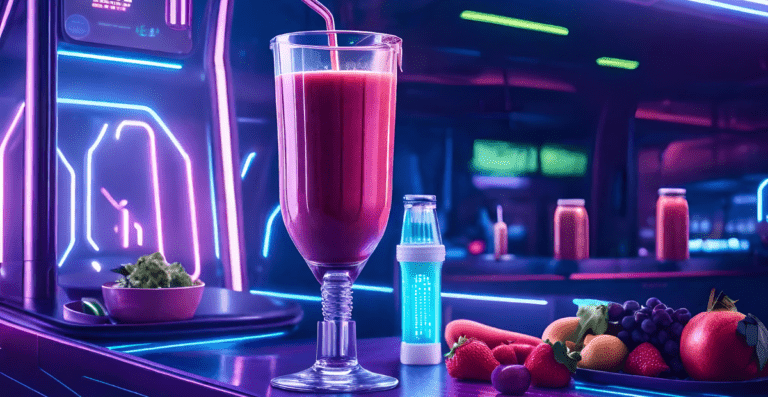
To optimize your performance and recovery, it’s essential to tailor your nutrition strategy based on individual factors such as body weight, training goals, and timing within the training year. Just like a well-tailored suit that fits perfectly, personalized nutrition recommendations will help you reach your goals precisely and effectively.
There are several key factors to consider when it comes to personalized nutrition recommendations. First, let’s talk about body weight. Your body weight plays a crucial role in determining your nutrient needs. For example, if you want to build muscle mass or improve body composition, you may need to increase your protein intake to support muscle protein synthesis. On the other hand, if weight loss is your goal, you may need to reduce overall calorie intake while ensuring adequate nutrient intake.
Secondly, training goals also play a significant role in determining personalized nutrition recommendations. If you’re an endurance athlete aiming for improved performance during long-duration activities, carbohydrate intake becomes particularly important for fueling those workouts. On the other hand, if strength and power are your focus as a bodybuilder or fitness competitor, protein intake should be prioritized to support muscle growth and repair.
Lastly, timing within the training year is another factor that can influence personalized nutrition recommendations. Different phases of training may require adjustments in nutrient timing and composition. For example, during periods of high-intensity training or competition preparation where energy demands are increased, precision nutrition strategies can help ensure optimal performance.
Incorporating these factors into your personalized nutrition plan can help maximize your results by providing the proper nutrients at the right times. Remember that everyone’s nutritional needs are unique and may require individualized adjustments. Consulting with a registered dietitian specializing in sports nutrition can provide valuable guidance in developing a personalized plan tailored to you.
Here is an example of how incorporating different factors into personalized nutrition recommendations could look:
-
Body Weight
-
Training Goals
-
Higher
-
Muscle gain, strength
-
Lower
-
Weight loss
Based on the example above, someone with a higher body weight and muscle gain as their training goal may benefit from a higher protein intake to support muscle protein synthesis. On the other hand, someone with a lower body weight and a weight loss goal may need to focus on reducing overall calorie intake while ensuring adequate nutrient intake.
By considering these factors and working closely with a registered dietitian or sports nutrition specialist, you can develop personalized nutrition recommendations tailored to your needs. This approach will help optimize your performance, support recovery, and ultimately help you achieve your fitness goals.
Frequently Asked Questions
What are the benefits of nutrient timing for exercise?
Nutrient timing can enhance your exercise performance and recovery. Consuming protein before a workout helps maintain muscle size, while carbs provide fuel. During exercise, protein prevents muscle breakdown, and carbs improve performance. Post-workout meals aid in recovery and muscle building.
Is it necessary to consume protein before a workout?
Consuming protein before a workout is not necessary for everyone. While it can help maintain or increase muscle size, reduce muscle damage, and enhance muscle-building capabilities, the importance of nutrient timing varies depending on individual needs and goals.
Can fats be included in pre-workout nutrition?
Yes, fats can be included in pre-workout nutrition. While carbohydrates and protein are essential for fueling workouts, healthy fats can help maintain blood glucose and insulin levels, providing sustained energy during exercise.
How much carbohydrate should be consumed during exercise?
Consuming 60-80 grams of carbohydrates per hour is recommended during exercise. This provides immediate fuel and enhances performance. Including protein with carbs can achieve the same benefits with only 30-45 grams of carbs per hour.
Are there any specific guidelines for post-workout nutrition timing?
Sure, let’s talk about post-workout nutrition timing. It’s a hot topic, but here’s the truth: no specific guidelines are set in stone. The best approach is to listen to your body and eat within one to two hours after training for optimal recovery.

Conclusion
Congratulations on reaching the end of this informative journey through the fundamentals of nutrition for energizing your workouts. You now understand the importance of timing your meals to optimize performance and recovery.
Remember, your body is like a well-oiled machine that requires the right fuel to operate at its best. Just as a race car needs high-quality gasoline to zoom down the track, your body needs minimally processed proteins, vegetables, quality carbs, and healthy fats to power your workouts.
So go ahead and nourish yourself with these nutrient-rich foods, hydrate like it’s your job, and watch as you reach new heights in your fitness journey.
Remember that while nutrient timing is crucial, the overall quantity of protein and carbohydrates consumed throughout the day plays an even more significant role.
Now go out there and unleash the athlete within you!
References
https://www.eatright.org/fitness/physical-activity/exercise-nutrition/timing-your-pre-and-post-workout-nutrition
https://www.verywellfit.com/muscle-protein-synthesis-and-muscle-growth-4148337
https://tinyurl.com/yfya72bc
https://tinyurl.com/23m8jeen
https://www.healthline.com/nutrition/eat-after-workout
https://familydoctor.org/athletes-the-importance-of-good-hydration/
https://www.nutrition.gov/topics/basic-nutrition/online-tools

